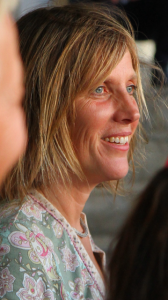Am 30.10.2015 starb die Dokumentarfilmemacherin und Leiterin der Abteilung für Film & Society am Schwedischen Filminstitut Tove Torbiörnsson nach schwerer Krankheit im Alter von nur 50 Jahren. Seit drei Jahren war Tove für FC GLORIA eine wichtige Verbündete im Engagement für die Gleichstellung der Frauen in der österreichischen Filmbranche. Auf der Diagonale 2013 folgte sie unserer Einladung, das Schwedische Quotenmodell im Rahmen unserer Podiumsdiskussion „Manche mögen’s gleich. Zur Praxis von Quotenmodellen“ in Graz zu präsentieren. Tove unterstützte seit damals unsere Bemühungen, den schwedischen Aktionsplan auch in Österreich durchzusetzen. Sie hielt auf Einladung des österreichischen Filminstituts ein Gender & Diversity Seminar für die Projektkommission des ÖFI, beriet uns bei den Gender-Evaluierungen der vergebenen Fördermittel nach schwedischen Modell, das künftig sowohl das Österreichische Filminstitut als auch der Filmfonds Wien als Berechnungsgrundlage anwenden werden, und inspirierte uns bei der Konzeption des Produzentinnen-Programms. Unser Mitgefühl gilt ihrem Mann Alberto, ihren vier Kindern und ihrer Freundin Anna Serner, Direktorin des schwedischen Filminstituts.
Nachruf von Anna Serner
Tove Torbiörnsson, Stockholm, has passed away following a period of illness. She is survived by her husband Alberto and their four children Julia, Joanna, Leo and Nora, and she is also mourned by other family members and many friends and colleagues around the world.
I met Tove at school. Tove was unlike anyone else. Her beautiful blue eyes constantly explored the world around her. Partly out of pure curiosity, but also a great sense of empathy and a strong desire to depict what she experienced in pictures and text. And to change the world. For Tove, nothing was impossible. She started out in documentary film at the age of 18, and remained loyal to film throughout her life. Perhaps her best-known film was Missing Boy (Hitta hem) from 1999. But she was not only a filmmaker. In the days before she became ill just under a year ago, her book of poetry Befinner mig i sovrummet was published, illustrated by her daughter Julia. There were going to be more films and books.
Tove and I moved to Madrid in 1986, the city where she met her husband Alberto. When she came to meet me at the airport she had his blue shirt with her, and she sniffed it to remind herself of him. So great was her passion. And as in all great passions, the peaks were high and the valleys low – so low at one point that they parted ways after two children. But they got back together and had two more. And Tove loves her children!
When Tove was a Film Commissioner at the Swedish Film Institute she recommended me as CEO, and as CEO I recruited her to be a head of department. Tove had a quite unique curiosity about art and the world around her. She made me a better boss. Tove has made so many people into better people. She could be poetic and vague, but also rigorous and perceptive. The films made with Tove as an advisor had their own distinct names behind them, but they were better because of her.
Perhaps that was Tove’s greatest challenge. Her heart wanted to help so many people, she was there for everybody. Had she not been so seriously ill, I’m sure her home would have been full of refugees today. Sometime she was there for so many people that she wasn’t there for herself. The thought that I’ll never talk to Tove again is unbearable. She was my best friend.

